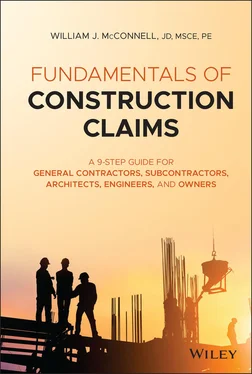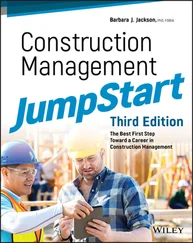Other design issues include scenarios where the contractor discovers design additions, changes, errors, or omissions in the contract documents that will cause an increase in the cost and/or time to perform the work. Certain contracts note that the contractor should advise the owner of the issue so the owner can render a position on the issue before the contractor initiates dispute resolution. The examples below highlight specific pre-claim requirements.
AIA A201 – Section 3.2.2-4: Before starting each portion of the work, the contractor shall review, in the contractor's capacity as a contractor, the various contract documents and field conditions and report to the architect any errors, omissions, or inconsistencies in the contract documents via a request for information. If upon review of the architect's response to the contractor's request for information, the contractor believes it will cause an increase in the cost and/or time to perform the work, then the contractor shall file a claim per Article 15.
AIA A201 – Section 4.2.11-14: The architect shall promptly respond to requests for information about the contract documents. Thus, before a design claim is issued, it is prudent for the contractor to get the architect's response to a request for information.
AIA A201 – Section 8.3.1: If the contractor is delayed by: actions of owner/architect/separate contractor; changes ordered in the work; force majeure events; abnormal weather; and/or other causes beyond the contractor's control, then the contract time shall be extended as determined by the architect. Section 8.3.3 notes that Section 8.3 does not preclude the contractor's recovery of delay damages from the owner under other provisions of the contract (namely, Article 15). Thus, the contractor should give the architect the ability to render a decision before a claim is initiated.
ConsensusDocs 200 – Section 3.3: Before commencing the work, the contractor shall review the contract document and report any visible conflicts to the owner. Upon receipt, the owner shall promptly inform the contractor on what action, if any, the contractor shall take.
EJCDC C-700 – Section 3.03.A.1-2: If, before or during the performance of work, the contractor discovers a design issue, the contractor shall promptly report it to the engineer in writing. The contractor is not to proceed with the affected work until the matter is resolved.
EJCDC C-700 – Section 3.04.A-B: During the performance of work, the contractor shall issue questions in writing (requests for information) regarding the design to the engineer as soon as possible after such matters arise. The engineer to respond to the contractor's questions with reasonable promptness. Based on the engineer's response, the contractor can submit a change proposal to the owner.
EJCDC C-700 – Section 11.09.B: The contractor shall submit change proposals to the engineer within 30 days after the start of the event giving rise thereto. Note that the change proposal shall comply with Section 4.05.D–E. The engineer is to render an initial decision on the change proposal within 30 days of proper submission. If the contractor does not agree with the engineer's initial decision, it can move to the dispute resolution procedures in Article 12.
B. Administration Issues
1. Submittal Issues
Certain contract forms require the contractor to issue a submittal schedule for approval before the contractor can assert delay claims regarding the owner's delinquent review of submittals. This typically takes place shortly after the execution of the contract when the contractor is assembling its schedule for the project. The underlined text below represents specific pre-claim requirements.
AIA A201 – Section 3.10.2: Promptly after being awarded the contract, the contractor to submit a submittal schedule to the architect for the architect's approval. If the contractor fails to submit a submittal schedule or fails to provide submittals in accordance with the approved submittal schedule, the contractor shall not be entitled to any increase in the contract sum or contract price based on the time required for review of submittals.
ConsensusDocs 200: ConsensusDocs 200 does not have a requirement for the contractor to issue a separate submittal schedule. However, Section 3.14.1 notes that the contractor shall deliver submittals to the owner and the design professional per the project schedule. Section 3.14.2 indicates that the owner is responsible for the review of submittals within reasonable promptness to avoid causing delays. Thus, the contractor should incorporate submittal submissions and submittal returns into its project schedule.
EJCDC C-700 – Section 2.03.A.2: Within 10 days after the effective date of the contract, the contractor shall transmit a submittal schedule to the engineer for approval. Section 7.16.C requires the engineer to review the submittals per the approved schedule of submittals. Thus, the contractor's claims related to delinquent submittal review should be based upon the approved schedule of submittals.
2. Other Administrative Issues
Most standard construction contracts require an owner decision on administrative issues before an issue should be moved to the claims process. The underlined text below represents the specific pre-claim requirements.
AIA A201 – Section 8.3.1: If the contractor is delayed by actions of owner/architect/separate contractor, etc., then the contract time shall be extended as determined by the architect. Section 8.3.3 notes that Section 8.3 does not preclude the contractor's recovery of delay damages from the owner under other provisions of the contract, such as Article 15. Thus, the contractor should give the architect the ability to render a decision before a claim is initiated.
ConsensusDocs 200: For all other administrative issues, this document refers to Section 8.4, which details formal claim notice requirements. Accordingly, no other pre-claim notice requirements are prescribed.
EJCDC C-700 – Section 11.09.B: The contractor shall submit change proposals to the engineer within 30 days after the start of the event giving rise thereto. Note that the change proposal shall comply with Section 4.05.D–E. The engineer is to render an initial decision on the change proposal within 30 days of proper submission. If the contractor does not agree with the engineer's initial decision, it can move to the dispute resolution procedures in Article 12.
C. Performance Issues
1. Claim for Negligent Acts or Omissions by the Owner that Cause Injury or Damage to the Contractor
When the owner's negligent acts or omissions cause damage to the contractor's person or property, a minority of standard contracts require the contractor to provide notice to the owner, so the owner is provided an opportunity to investigate and possibly mitigate damage. The examples below outline the specific pre-claim requirements.
AIA A201 – Section 10.2.8: If the contractor suffers injury or damage to person or property because of an act or omission of the owner, the contractor shall give notice to the owner no longer than 21 days after discovery so the owner can investigate the matter.
ConsensusDocs 200: Section 10.1.2 notes that the owner shall indemnify the contractor from all claims from bodily injury and property damage by the negligent or wrongful acts of the owner or design professionals, but this form does not require contractor to provide the owner with a specific notice.
EJCDC C-700: Section 7.16.A–B indicates that the owner shall indemnify the contractor from negligent actors or omissions by the owner and engineer, but this form does not require the contractor to provide the owner with a specific notice.
Читать дальше












